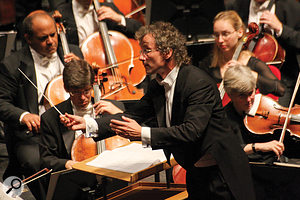TV composers usually work at a safe distance, but you can't beat the excitement of a big live spectacular.
 "Gentlemen, please, a little more solemnity. Let us treat the works of Mr. Manilow with the respect they deserve.”
"Gentlemen, please, a little more solemnity. Let us treat the works of Mr. Manilow with the respect they deserve.”
Some gigs are terrible. Some gigs might seem worth doing, but are ultimately meaningless. Some gigs might make you some money, but also make you feel like you are wasting your talent. Some gigs never happen — and some gigs are, basically, bloody brilliant in every possible way.
A hundred years ago, a group of leading singers and performers decided to put on a gig in London in aid of the Theatrical Artistes Benevolent Fund. Primarily designed to entertain King George V and Queen Mary, it was such a roaring success that it turned into an annual event. This came to be known as the Royal Variety Performance and, in a neat coincidence, its 100th anniversary fell in a year that saw the Queen's Diamond Jubilee, the Olympics come to London and the first decent James Bond film in ages. So obviously the organisers wanted to up the stakes, up the ante and make what can only be described as a bit of a big deal of it all.
Kylie was booked. So were Robbie Williams, One Direction, Neil Diamond, Rod Stewart, Bruce Forsyth, Ronnie Corbett — the whole ensemble. Then they decided they needed some commissioned theme music to hold it all together, and they decided to ring me.
On The Shoulders Of Giants
It was one of those conversations you remember only vaguely, filled with expressions like "live orchestra”, "woodwind section”, "Royal Albert Hall”, and "in the presence of Her Majesty the Queen”. I think I ended it by quietly suggesting in a trembling voice that they perhaps might instead like to ask a grown-up to help them. I was, after all, being asked to undertake the same commissioned music job that had, in 1919, been handled by none other than Sir Edward Elgar.
However, the melodica busking business had taken a sharp downturn towards the end of the year, so I decided to take the commission and threw myself into the task with grit, determination and valour, as befits my status as a brave Englishman. A few weeks later, I found myself in dress rehearsals at the Royal Albert Hall, sharing a cup of coffee with Placido Domingo and discussing the relative merits of orchestral positioning in a live performance. Girls Aloud were eight feet in front of us, struggling to make sure their gravity-defying stage costumes wouldn't be performing any 'wardrobe malfunctions' in front of the Constitutional Monarch of 16 Sovereign States, Supreme Governor of the Church of England and The Daughter of The Last Empress of India. I'd arranged the 15 cues needed for the show for the orchestra using Logic, and now there was nothing more for me to do than sit back and hope I'd got all the transpositions right, remembered how low the clarinets can play and which key trombones prefer.
Nervous Moments
When the Beatles played the show in 1963, John Lennon uttered his famous quote about people in the cheap seats clapping while "everyone else rattle your jewellery”, and to say the crowd on the night were well-to-do doesn't really cover it. The safety of the studio seemed a very long way away. There would be no second takes, no quantisation, pitch correction or fixing in the mix. This was as real and as live and important as gigs go. The show would go on, whether or not I was embarrassing myself in front of a huge global TV audience and the world's most elite guests. This was music-making without a safety net, and it felt amazing.
The lights dimmed, the curtain went up, the conductor's baton hung in the air and in a heartbeat, suddenly it was showtime...
